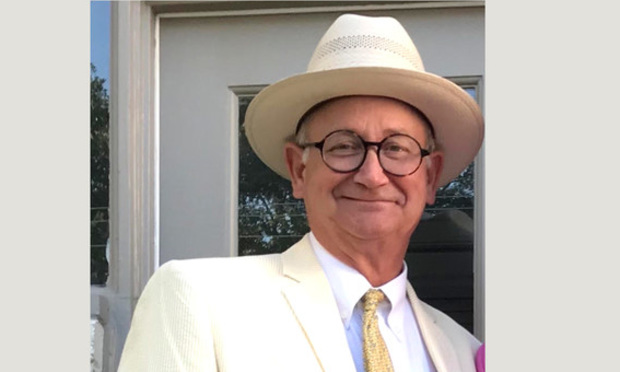Litigator of the Week: Wills Point Attorney Helps Civil Rights Litigator Out of Disciplinary Jam
Prater Monning was introduced to S. Lee Merritt, a high-profile civil rights lawyer from Philadelphia who'd gotten into trouble with Texas' Unauthorized Practice of Law Committee on charges that he illegally represented clients in the state.
December 14, 2018 at 04:27 PM
5 minute read
 Prater Monning of Wynne & Wynne/courtesy photo
Prater Monning of Wynne & Wynne/courtesy photo
Prater Monning had heard about out-of-state lawyers being prevented from representing civil rights clients in the 1960s South when he was still in high school. And the professional responsibility lawyer never thought he would get the chance to represent a modern-day attorney in the same predicament.
But Monning was later introduced to S. Lee Merritt, a high-profile civil rights lawyer from Philadelphia who'd gotten into trouble with Texas' Unauthorized Practice of Law Committee (UPLC) on charges that he illegally represented clients in the state.
Out-of-state lawyers are allowed to practice in federal courts in Texas, but they are not allowed to practice in state district court unless they are formally admitted under pro hac vice rules.
“I typically would not have taken this, but it just didn't smell right. I thought the UPLC just went after people selling will kits, not civil right lawyers,” Monning said of Merritt's case. “Back in the 1960s, people were being arrested for practicing civil rights.”
And earlier this year, it appeared that Merritt might meet the same fate as his 1960s civil rights lawyer compatriots because of the UPLC litigation.
Merritt, who has a Dallas office, has made a name for himself representing North Texas clients in federal civil rights cases alleging they were victims of police brutality. He currently represents the families of Botham Jean, a 26-year-old accountant killed by a Dallas police officer who shot him after she allegedly entered his apartment thinking it was hers and mistook him for an intruder; and Jordan Edwards, a 15-year-old high school student who was killed by Roy Oliver, a Balch Springs police officer who was later convicted of murder.
The UPLC filed a complaint against Merritt in a Collin County district court, alleging that he had improperly represented clients in a state district court with another Texas lawyer although Merritt did not have a Texas law license.
Merritt later entered into a consent decree with the UPLC in which he agreed not to participate in civil rights cases filed in state district court, though he made no such agreement as to federal courts.
However in November, the UPLC filed a motion for 16 counts of civil and criminal contempt against Merritt related to allegations that he signed up three more clients who had state law civil rights claims.
“I was looking as six months of incarceration,” Merritt said of the contempt motion.
“With a punitive conviction, I would have had to report that to every court in which I practice,” Merritt said. “It probably would have meant I had to withdraw from the representation of Botham Shem Jean … and Jordan Edwards, and those are just some of the high-profile cases I have in a foreign jurisdiction outside of my home jurisdiction.''
Monning argued to State District Judge Cynthia Wheless that every one of Merritt's clients had a potential federal civil rights claim. He was joined in his argument by Yodit Tewolde, a Dallas lawyer who also defended Merritt against the UPLC.
“He was limiting his practice to federal civil rights practice. And he has a well-recognized right because he is licensed in another state,” Monning said. “He's had that right, since the 1960s, to practice law in another court.''
And to back up his argument, Monning hit the law books and recounted how out-of-state civil rights lawyers faced the same blowback by State Bar officials when pursuing cases in southern states. The UPLC is an arm of the Texas Supreme Court.
“In order for him to find the appropriate case law, he had to go back to litigation from the 1960s dealing with the NAACP using Yankee lawyers to enforce civil rights law,” Merritt said. “It became important to put this prosecution in the historical perspective.''
Wheless agreed with Monning's argument and tossed out all 16 of the contempt charges against Merritt.
Leland de la Garza, a member of the UPLC, said the committee is considering appealing Wheless' ruling. He also noted that the case the UPLC pursued against Merritt is unusual.
“Most UPL committee complaints don't involve a lawyer who is licensed in another state. Most involve a person who is not licensed anywhere,” said de la Garza, a shareholder in Dallas' Hallett & Perrin.
“The case involving Lee Merritt raises the issue of whether or not Merritt is conducting a federal law practice or a state law practice,” de la Garza said. “That was the point in dispute based on the injunction that he agreed to. We thought that he was engaging in a state law practice, but Judge Wheless found otherwise.''
Monning said that because civil rights work is not a lucrative field for most attorneys, he took Merritt's case on what he calls an “accidental pro bono” basis.
“I send Lee bills and if Lee is wildly successful, I'll probably get paid,” said Monning, who years ago decamped from a big Dallas law firm practice and moved 50 miles east to Wills Point, a small town where his grandfather once practiced law. “In a country practice, that's about half of what you do.''
Merritt confirmed the payment arrangement he has with Monning.
“I've made minimal payments,” Merritt said with a laugh. “He's still waiting for me to win a big suit.''
This content has been archived. It is available through our partners, LexisNexis® and Bloomberg Law.
To view this content, please continue to their sites.
Not a Lexis Subscriber?
Subscribe Now
Not a Bloomberg Law Subscriber?
Subscribe Now
NOT FOR REPRINT
© 2025 ALM Global, LLC, All Rights Reserved. Request academic re-use from www.copyright.com. All other uses, submit a request to [email protected]. For more information visit Asset & Logo Licensing.
You Might Like
View All
Foley Partner Wrapping Up Long Legal Career, 29 Years of Chairing MLK Jr. Oratory Competition in Houston
3 minute read
Texas-Based Ferguson Braswell Expands in California With 6-Lawyer Team From Orange County Law Firm
2 minute read

Crypto Entrepreneur Claims Justice Department’s Software Crackdown Violates US Constitution
4 minute readTrending Stories
Who Got The Work
J. Brugh Lower of Gibbons has entered an appearance for industrial equipment supplier Devco Corporation in a pending trademark infringement lawsuit. The suit, accusing the defendant of selling knock-off Graco products, was filed Dec. 18 in New Jersey District Court by Rivkin Radler on behalf of Graco Inc. and Graco Minnesota. The case, assigned to U.S. District Judge Zahid N. Quraishi, is 3:24-cv-11294, Graco Inc. et al v. Devco Corporation.
Who Got The Work
Rebecca Maller-Stein and Kent A. Yalowitz of Arnold & Porter Kaye Scholer have entered their appearances for Hanaco Venture Capital and its executives, Lior Prosor and David Frankel, in a pending securities lawsuit. The action, filed on Dec. 24 in New York Southern District Court by Zell, Aron & Co. on behalf of Goldeneye Advisors, accuses the defendants of negligently and fraudulently managing the plaintiff's $1 million investment. The case, assigned to U.S. District Judge Vernon S. Broderick, is 1:24-cv-09918, Goldeneye Advisors, LLC v. Hanaco Venture Capital, Ltd. et al.
Who Got The Work
Attorneys from A&O Shearman has stepped in as defense counsel for Toronto-Dominion Bank and other defendants in a pending securities class action. The suit, filed Dec. 11 in New York Southern District Court by Bleichmar Fonti & Auld, accuses the defendants of concealing the bank's 'pervasive' deficiencies in regards to its compliance with the Bank Secrecy Act and the quality of its anti-money laundering controls. The case, assigned to U.S. District Judge Arun Subramanian, is 1:24-cv-09445, Gonzalez v. The Toronto-Dominion Bank et al.
Who Got The Work
Crown Castle International, a Pennsylvania company providing shared communications infrastructure, has turned to Luke D. Wolf of Gordon Rees Scully Mansukhani to fend off a pending breach-of-contract lawsuit. The court action, filed Nov. 25 in Michigan Eastern District Court by Hooper Hathaway PC on behalf of The Town Residences LLC, accuses Crown Castle of failing to transfer approximately $30,000 in utility payments from T-Mobile in breach of a roof-top lease and assignment agreement. The case, assigned to U.S. District Judge Susan K. Declercq, is 2:24-cv-13131, The Town Residences LLC v. T-Mobile US, Inc. et al.
Who Got The Work
Wilfred P. Coronato and Daniel M. Schwartz of McCarter & English have stepped in as defense counsel to Electrolux Home Products Inc. in a pending product liability lawsuit. The court action, filed Nov. 26 in New York Eastern District Court by Poulos Lopiccolo PC and Nagel Rice LLP on behalf of David Stern, alleges that the defendant's refrigerators’ drawers and shelving repeatedly break and fall apart within months after purchase. The case, assigned to U.S. District Judge Joan M. Azrack, is 2:24-cv-08204, Stern v. Electrolux Home Products, Inc.
Featured Firms
Law Offices of Gary Martin Hays & Associates, P.C.
(470) 294-1674
Law Offices of Mark E. Salomone
(857) 444-6468
Smith & Hassler
(713) 739-1250






